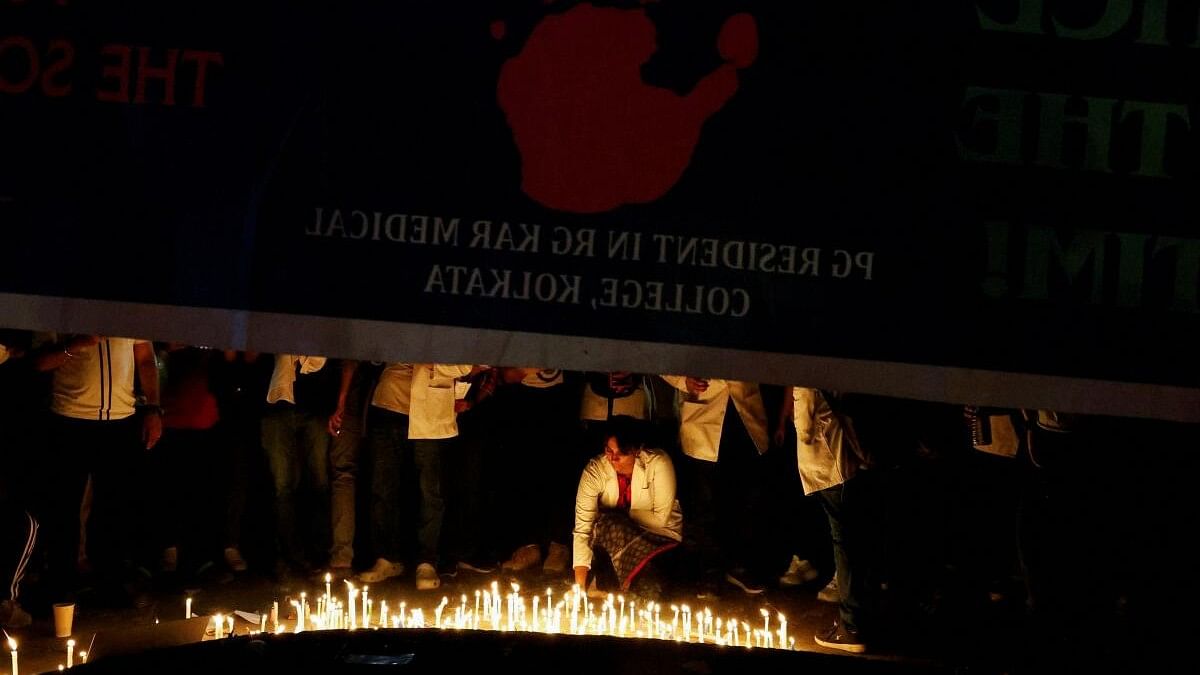
Doctors light candles to pay homage to a victim of rape and murder, who was a a trainee medic at a hospital in Kolkata.
Credit: Reuters Photo
New Delhi: The Supreme Court, which formed a National Task Force to suggest measures for protection of medical fraternity, on Tuesday noted portents of a systemic failure to protect doctors, particularly women professionals, nurses and para medical staff in the confines of hospitals with recent incidents of violence.
"Women are at particular risk of sexual and non-sexual violence in these settings. Due to ingrained patriarchal attitudes and biases, relatives of patients are more likely to challenge women medical professionals. In addition to this, female medical professionals also face different forms of sexual violence at the workplace by colleagues, seniors and persons in authority. Sexual violence has had its origins even within the institution, the case of Aruna Shanbag being a case in point," a bench led by Chief Justice of India D Y Chandrachud said.
Dealing with a suo motu matter related to Kolkata rape and murder of 31-year-old post graduate doctor, a bench, also comprising Justices J B Pardiwala and Manoj Misra, said medical professionals in the performance of their duties have been unfortunate targets of various forms of violence.
The court also listed out a few incidents of recent violence unleashed against the medical professionals, including of Bihar and Hyderabad.
"With few or no protective systems to ensure their safety, medical professionals have become vulnerable to violence," the bench said.
The court pointed out there is a hierarchy within medical colleges and the career advancement and academic degrees of young professionals are capable of being affected by those in the upper echelons.
"The lack of institutional safety norms at medical establishments against both violence and sexual violence against medical professionals is a matter of serious concern. While gendered violence is the source of the more malevolent manifestations of the structural deficiencies in public health institutions, the lack of safety is of concern to all medical professionals," the bench said.
The court felt preserving safe conditions of work is central to realising equality of opportunity to every working professional.
"This is not just a matter of protecting doctors. Their safety and well-being as health providers is a matter of national interest. As more and more women join the work force in cutting edge areas of knowledge and science, the nation has a vital stake in ensuring safe and dignified conditions of work. The constitutional value of equality demands nothing else and will not brook compromises on the health, well being and safety of those who provide health care to others," the bench said.
The court also noted several states, such as Maharashtra, Kerala, Karnataka, Telangana, West Bengal, Andhra Pradesh and Tamil Nadu have enacted legislation to protect healthcare service professionals from violence and damage to property.
"All these enactments prohibit any act of violence against medical professionals. The offence is non-bailable and punishable with three years of imprisonment. However, these enactments do not address the institutional and systemic causes that underlie the problem. An enhanced punishment without improving institutional safety standards falls short of addressing the problem effectively," the bench said.
